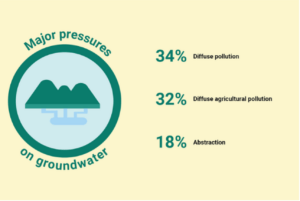On 15 October, the European Environment Agency (EEA) published a new report on the state of Europe's waters. According to the report, the EU is failing to meet its targets for improving the status of water bodies under the Water Framework Directive.
 The EEA outlines three overarching challenges for future water management in Europe:
The EEA outlines three overarching challenges for future water management in Europe:
- protecting and restoring aquatic ecosystems;
- achieving the zero pollution ambition;
- adapting to water scarcity, drought and flood risks.
The EEA stresses that the most significant driver impacting the quality of both surface and groundwaters is the intensive use of nutrients and pesticides in agricultural production. Agriculture is also by far the highest net water consumer in Europe and, without changes in practices, demand from irrigated agriculture is likely to increase with climate change.
In terms of pollution where agriculture is a major contributor, between 2013 and 2024, 10-25% of all surface water monitoring sites reported to the EEA detected one or more pesticides above their effect threshold. Similarly, average nitrate concentrations in groundwater have not been reduced between 2000 and 2021.
Finally, the report calls for better water management, stressing that current European practices are poorly adapted to climate change events and that there is an urgent need to improve water resilience.
The EEA report 07/2024 ‘here
